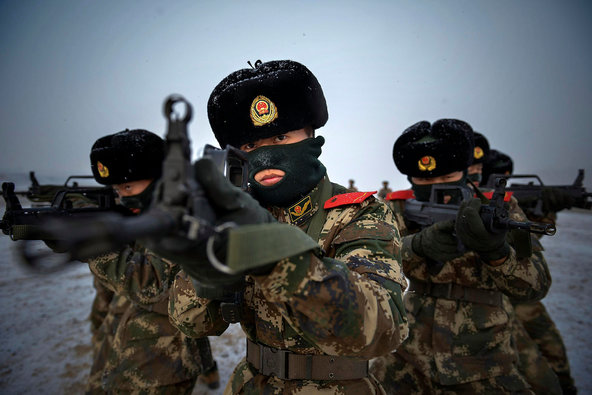Three knife-wielding assailants reportedly launched an attack at the Guangzhou railway station on Friday, injuring nine. Police shot dead one attacker and detained a second, with the third still at large. Witnesses interviewed by the South China Morning Post said that the attackers appeared to be members of the Uyghur ethnic group. Mimi Lau and Stephen Chen report:
Three witnesses told the South China Morning Post the three attackers were ethnic Uygurs.
The attacks in Guangzhou began at 8.18 am.
Two men assaulted people leaving from an exit at the station while the other attacked people nearby, witnesses said.
One of the men was armed with two knives, while the others carried one weapon each.
[…] The attacks come at a politically sensitive time in China as the government is holding the annual sessions of the National People’s Congress and the nation’s main political advisory body in Beijing. [Source]
Propaganda authorities have ordered images of the attack and similar types of “negative news” to go unreported as the National People’s Congress (NPC) meetings continue. Last May, six were injured in a knife attack at the same Guangzhou train station.
Shortly after the May attack there were adamant calls for anti-terror legislation from inside the establishment, and authorities launched (and recently extended) a nationwide crackdown on terrorism. The crackdown has so far done little to curtail violence in Xinjiang—and as this recent attack in Guangzhou shows, in China at large. In January, a draft counterterrorism law expected to be passed by the NPC this week was criticized by Human Rights Watch’s Sophie Richardson as “little more than a license to commit human rights abuses.” Looking closely at the draft, Germany-based legal scholar Zunyou Zhou expressed concern with the nebulous definition of terrorism it contained; while the menacing inclusion of thought crimes was subsequently nixed from the proposal, censure of the incoming law’s potential implications for human rights continues to reverberate. The Washington Post’s Simon Denyer reports:
“[…W]hat we are really concerned about in China is that these measures are incredibly broad, and we are worried they can be used to attack dissidents,” said [Julia Famularo, who has been studying the law for the Project 2049 Institute].
One of those dissidents, Hu Jia, under house arrest since last June, said the law might appeal to people angry at terrorist attacks, but it was fundamentally designed to extend a comprehensive system of control introduced by President Xi.
“Once you want to exercise your political rights as a citizen, you will touch the red line and be caught in the net,” he said in a telephone interview. “According to criminal procedure law, your right to a lawyer will be restricted if you are accused of endangering state security or terrorism. And because the government controls propaganda, if they say you are a terrorist, then you are.”
[…] Although the Chinese government has a right and responsibility to provide public order, says Sophie Richardson of Human Rights Watch, the law, and the security mind-set it lays bare, “is just as likely to fuel unrest and violence as it is to mitigate it.”
Richardson says an “incredibly broad spectrum of behavior” can be construed as criminal, “with no avenues to challenge it.” […] [Source]
The Post also highlights concerns expressed by the White House over the draft law’s demand that IT companies with business in China disclose data in the name of security, which China’s Foreign Ministry has struck down as a U.S. misunderstanding.
A post from London-based human rights NGO Amnesty International similarly expresses concern with the proposed law’s implications on the freedoms of religion and expression, and also ethnic rights in China:
Despite recent revisions, the draft law has virtually no safeguards to prevent those who peacefully practice their religion or simply criticize government policies from being persecuted on broad charges related to “terrorism” or “extremism”.
[…] “China has a duty to protect people from violent attacks but this draconian law is not the answer. National security is being used as a pretext to further attack religious freedom and silence government critics,” said William Nee, China Researcher at Amnesty International.
[…] Religious freedom comes under specific attack in the draft legislation. Anyone who provides venues for religious worship could potentially be criminalized and branded as “terrorists” or “extremists”, even if the religious practices are completely peaceful. […] [Source]
Amnesty’s William Nee further discusses the draft law in an interview at Deutsche Welle, which includes a recommendation that Beijing scrap the draft and start a fresh proposal better aligned with international human rights standards:
DW: What does this new anti-terror law stipulate?
William Nee: With 106 articles in total, the draft anti-terrorism law stipulates many things, not all of which we can analyze fully at this moment. Perhaps the most important point is that it allows the authorities to put people with “terrorist or extremist tendencies” in some sort of educational or correctional system, possibly arbitrary detention, without trial.
There are also a series of restrictive measures that may be imposed against people suspected of terrorism. Also of concern, the definitions of terrorism and extremism remain overly broad, and could very easily restrict non-violent forms of freedom of expression.
Under international standards, national security legislation should be written narrowly and with precision, and it should focus on legitimate and demonstrable threats to the country’s existence or territorial integrity. Furthermore, freedom of expression, including criticizing government policies or the government itself should be explicitly protected.
But the overly broad definition of extremism could mean that almost any behavior or speech that the government doesn’t like could qualify as “extremism.” Also, the law specifically states that “misrepresenting or insulting state policies, laws, administrative regulations” would qualify as “extremism,” and this clearly contravenes international human rights law and standards. […] [Source]
Read more on Xinjiang violence and terrorism via CDT.








